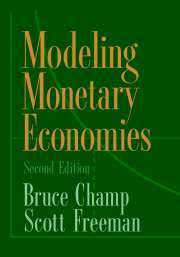Part III - Government Debt
Summary
IN PARTS I and II we concentrated on money itself, whether fiat, commodity, or inside money. But money's effect on the economy is not limited to the direct effects we have studied so far. In Part III we look at the indirect effects of monetary policy, in particular its effect on the national debt. We will see that the national debt may have important effects on aggregate saving and investment. We will therefore examine the effect of monetary policy on the national debt and, through this, its effect on saving and investment.
Chapter 13 begins by presenting a model in which individuals willingly hold both fiat money and interest-bearing government debt. With this model in hand, we can begin to answer crucial questions such as the feasibility of continual debt financing. We also explore more thoroughly the government budget constraint to determine how the presence of government debt affects the options available to governments over time and the interaction of fiscal and monetary policy.
Chapter 14 provides a detailed look at individual decisions about saving and consumption. We unravel the important determinants of these variables. In particular, we study the effect of taxes on an individual's choices of saving and consumption over time.
Chapter 15 applies the lessons of the previous chapter to study the effect of the national debt on consumption, saving, investment, and output. Appendix A of Chapter 15 studies the effect of fiat money balances on wealth and the formation of private capital. This appendix also shows how the issuance of government debt can be used to transfer wealth between generations as a means to offset the redistributional effects of changes in the demand for money.
- Type
- Chapter
- Information
- Modeling Monetary Economies , pp. 231 - 232Publisher: Cambridge University PressPrint publication year: 2001



